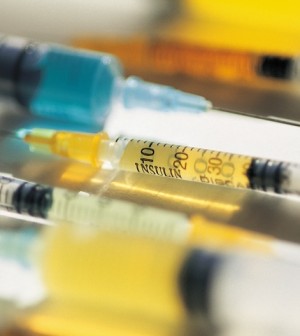- 8 Ways to Increase Dopamine Naturally
- 7 Best Breads for Maintaining Stable Blood Sugar
- Gelatin vs. Collagen: Which is Best for Skin, Nails, and Joints?
- The Long-Term Effects of Daily Turmeric Supplements on Liver Health
- Could Your Grocery Store Meat Be Causing Recurring UTIs?
- Are You Making This Expensive Thermostat Error This Winter?
- Recognizing the Signs of Hypothyroidism
- 10 Strategies to Overcome Insomnia
- Could Artificial Sweeteners Be Aging the Brain Faster?
- Techniques for Soothing Your Nervous System
Health Highlights: Nov. 8, 2013


Here are some of the latest health and medical news developments, compiled by the editors of HealthDay:
Sisters Claim HPV Vaccine Caused Ovaries to Stop Making Eggs
Two sisters who say the cervical cancer vaccine Gardasil caused their ovaries to stop producing eggs have filed a claim with a federal compensation program.
The allegation by Madelyne Meylor, 20, and Olivia Meylor, 19, of Mount Horeb, Wisc. is the first of its kind to reach a hearing through the National Vaccine Injury Compensation Program, their lawyer Mark Krueger told the Wisconsin State Journal, the Associated Press reported.
The program is a special court created to evaluate claims of harm from vaccines.
Evidence doesn’t support a relationship between Gardasil and the sisters’ condition, vaccine maker Merck and Co. said in a statement. The U.S. Centers for Disease Control and the Food and Drug Administration say Gardasil is safe, the AP reported.
Gardasil is one of two vaccines (the other is Cervarix) approved in the U.S. to protect against human papillomavirus (HPV), which can cause cervical cancer, throat cancer, genital warts and other conditions.
The vaccine injury program has issued payments for HPV vaccine injuries in 68 cases for a total of at least $5.9 million, has dismissed 63 claims, and has 81 claims pending, according to the federal government and the nonpartisan foundation Judicial Watch, the AP reported.
——
Artificial Heart Valve Pioneer Dies
An American cardiovascular surgeon who pioneered artificial heart valves died Monday at age 89, according to officials at Allegheny General Hospital in Pittsburgh.
Dr. George Magovern co-invented a sutureless heart valve, which was first used in 1962. The device shortened the time needed for such surgeries, thereby increasing the chances that patients would survive, the Associated Press reported.
Many of Magovern’s cutting-edge heart surgery techniques were introduced at Allegheny General Hospital.
His son, Dr. George Magovern Jr., is chief of thoracic and cardiovascular surgery at Allegheny Health Network. He said his father is recognized for heart surgery techniques in the same way that Jonas Salk is associated with the polio vaccine and Thomas Starzl with organ transplants, the AP reported.
—–
Few Kid’s Meals at Fast-Food Chains are Healthy: Report
Only 33 of 5,427 possible meals for children at 18 U.S. fast-food chains are healthy, according to a new report from the Yale Rudd Center for Food Policy and Obesity.
The researchers came up with that figure after analyzing the menu offerings from the chains in order to consider all possible combinations of main dishes, sides and drinks. The 33 meals deemed healthy account for only 1 percent of all the possible meals for kids, the Los Angeles Times reported.
The researchers did find that 11 of the 12 restaurants with kids’ meals had at least one option for a healthy side dish, such as salads, corn, green beans, applesauce, sliced apples, bananas and fruit cups.
The study also found that more than three-quarters of the fast-food chains offered a healthy drink choice, such as unflavored milk, 100 percent juice, or bottled water, the Times reported.
The Yale team also found that the restaurants reduced the number of commercials aimed at children ages 6-11, but increased the number of ads targeted at teens.
Copyright © 2026 HealthDay. All rights reserved.










